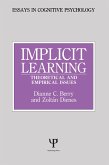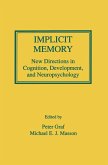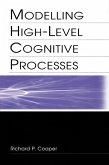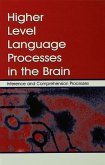Because it is impossible to make sense of implicit processes without taking into account their explicit counterparts, consideration is also given to explicit memory, learning, and expertise; and controlled processing. The chapter authors consider principles, processes, and models which stand above a wealth of data collected to evaluate models designed specifically to account for data from a specific paradigm, or even more narrowly, from a specific experimental task. The motivation behind this approach is the proposition that modeling is possible for a much broader data domain, even though there may be some cost where specific tasks are concerned. The aim of this book is to treat synthesis as the objective, and to approach this objective by collecting and discussing phenomena which--although they are drawn from diverse areas of psychological science--touch a single issue concerning the distinction between explicit and implicit processes.
Dieser Download kann aus rechtlichen Gründen nur mit Rechnungsadresse in A, B, BG, CY, CZ, D, DK, EW, E, FIN, F, GR, HR, H, IRL, I, LT, L, LR, M, NL, PL, P, R, S, SLO, SK ausgeliefert werden.









